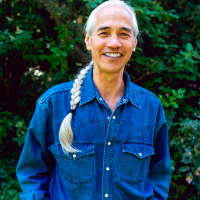As herd animals, we are biologically hardwired to seek love.
It is our nature. Yet for many, love proves elusive. What begins with exhilarating joy and euphoric promise, all too often ends in disappointment and disgust.
Some years ago on a trip to Japan (when people still lived on tatami mats), I asked a young fellow, “How do arranged marriages work? Don’t you have to love the person you’re going to marry?” He explained, as though obvious, “It takes years, some hard times, a couple of kids before you can speak of love.” What I was calling love, in comparison, was more like going steady in high school.
Much of our intimate relationship angst originates from the imprecise and confusing way we use the word “Love,” as described in the following excerpt from aah . . . The Pleasure Book, Chapter 20, Make Relationship:
There is no love greater
than Love with no object.
For then you, yourself,
have become love itself.
~ Rumi
When we utter the words, “I love you,” we are speaking from a dualistic perspective in which “I” is the subject, “love” is the verb (the action performed), and “you” is the object that receives the action. Notice that the rules of our grammar (syntax) powerfully structure the way we think and the meaning our words convey (semantics).
Typically, the emphasis is on the subject “I,” and “you” is objectified (reduced to an object). We refer to this as conditional love because in order to receive love, “you,” the love-object, must fulfill certain conditions: “I love you as long as it benefits me and you service my needs,” as with any useful piece of equipment. And if the love-object fails to perform adequately, we either try to change it or replace it with a better model. This can lead to disposable relationships—a common occurrence these days with 50 percent of marriages ending in divorce and lasting an average of seven years.
But if two people who voluntarily come together and publicly swear their love and allegiance to each other can’t make it, what hope is there for the rest of us? What hope is there for world peace? . . .
. . . The problem is that when we objectify others, we objectify ourselves. Human relationships are becoming mere object-object relationships. Take, for example, the prevalent practice of sexual objectification. In order to use a person as a sexual object, we must first objectify our own sexuality, that is, we must first disconnect sexual pleasure from emotional love; disconnect our pelvis from the heart in the same way that you might disconnect an amplifier from a stereo receiver.
People become replaceable, interchangeable cogs. Mothers and fathers have been reduced to “parental units.” Ghosting is commonplace. As my friend Steve likes to say, “In a perfectly efficient society, people are redundant.” (Press 1 for reservations; press 2 for departures; press 3 for….) Today, we live “on the clock,” where time is money and we never seem to have enough. As we will see, objectified living greatly diminishes our ability to experience pleasure.
Less common, but often praised, is unconditional love where the focus is on the object rather than the subject. Unconditional love says, “I love you no matter what you do.” In this case, the subject “I” is thingified, as illustrated in the following German fairy tale my father told me:
A young man fell in love with a beautiful woman in a neighboring village. As proof of his love, she demanded he cut out his mother’s heart and bring it to her. His desire for her was so great that he did her bidding, cut out his mother’s heart, and wrapped it in a cloth. Running through the forest to his love, he tripped over a log and dropped his mother’s bleeding heart on the ground. From beneath the blood-clotted cloth came a tender cry, “Are you hurt, my son?”
Conditional and unconditional love are both dualistic, which I will refer to as love with a small “l.” Generally, this kind of love occurs at the first three levels of the Pleasure Prism with physical, emotional, and mental love objects. It is only when we get to the äsis level that we experience true Love with a capital “L.” The Christian term for such exalted Love is agape. To be agape is literally to be slack-jawed with your mouth open in a state of awe.
Have you ever wondered why medieval churches have such tall towers and frescos painted on their vaulted ceilings? Churches were built to inspire awe. When we look heavenward, our mouth naturally gapes open, releasing our palate and putting us in the proper relationship to God and, by extension, the authority of the church. Government buildings are designed to have a similar effect.
In true Love, the subject-object duality is recollected into Original Wholeness (the first Law of Pleasure). We arrive once again at the limits of language where “ideas, language, even the phrase ‘each other’ doesn’t make any sense,” as Rumi wrote. For this reason, true Love can never be a personal love, because as with samadhi, there is no person, no individual subject, no I who is doing the loving, nor an object receiving the love.
In the moment of true Love, “I love you” makes no sense because there is only the activity of Love.
When we awaken from our self-centered delusion of I, me, mine, and myself that objectifies and separates us from the world, we become a Buddha (an honorific title for one who is “awake”) and realize that the entire cosmos has been Loving and supporting our existence since before we were born. Indeed, we are nothing other than a living expression, a star child of the cosmos.
Therefore, we cannot try to Love, just as we cannot try to surrender. Rather, the moment we let go of fear, the walls of duality vanish, and we are in Love, or more precisely, we disappear into the activity of Love and become Love itself.
Happy Valentine’s Day!
~
To find out more, please check out aah . . . The Pleasure Book trailer here.









Read 2 comments and reply